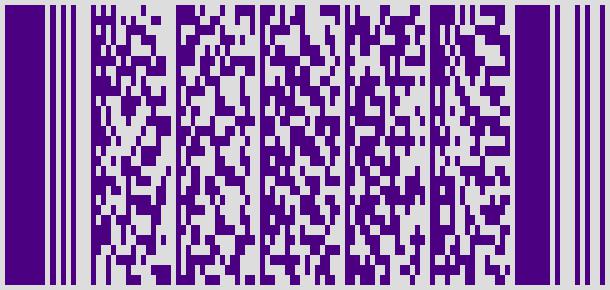PDF417 barcode generator for Python




Easily encode your data into a 2D barcode using the PDF417 format.
Licensed under the MIT License, see LICENSE.
Installation
Install using pip:
pip install pdf417gen
CLI
The pdf417gen command can be used to generate a barcode from commandline. It
takes the input either as an argument or from stdin.
# Show help
pdf417gen encode --help
# Encode given text and display the barcode
pdf417gen encode "Beautiful is better than ugly"
# Encode given text and save barcode to a file (extension determines format)
pdf417gen encode -o barcode.png "Explicit is better than implicit"
# Input from a file
pdf417gen encode < input.txt
# Piped input
python -c "import this" | pdf417gen encodeUsage
Creating bar codes is done in two steps:
- Encode a string to a list of code words using
encode() - Render the barcode using one of the rendering functions:
render_image(),render_svg().
Usage overview:
from pdf417gen import encode, render_image, render_svg
# Some data to encode
text = """Beautiful is better than ugly.
Explicit is better than implicit.
Simple is better than complex.
Complex is better than complicated."""
# Convert to code words
codes = encode(text)
# Generate barcode as image
image = render_image(codes) # Pillow Image object
image.save('barcode.jpg')
# Generate barcode as SVG
svg = render_svg(codes) # ElementTree object
svg.write("barcode.svg")Supports strings (unicode in py2) and byte arrays (str in py2):
# These two inputs encode to the same code words
encode(u"love 💔")
encode(b"love \xf0\x9f\x92\x94")
# Default encoding is UTF-8, but you can specify your own
encode(u"love 💔", encoding="utf-8")Encoding data
The first step is to encode your data to a list of code words.
encode(data, columns=6, security_level=2˙)Columns
The bar code size can be customized by defining the number of columns used to render the data, between 1 and 30, the default value is 6. A bar code can have a maximum of 90 rows, so for larger data sets you may need to increase the number of columns to decrease the rows count.
codes = encode(text, columns=12)
image = render_image(codes)
image.show()Security level
Increasing the security level will produce stronger (and more numerous) error
correction codes, making the bar code larger, but less prone to corruption. The
security level can range from 0 to 8, and procuces 2^(level+1) error
correction code words, meaning level 0 produces 2 code words and level 8
produces 512. The default security level is 2.
codes = encode(text, columns=12, security_level=6)
image = render_image(codes)
image.show()Render image
The render_image function takes the following options:
scale- module width, in pixels (default: 3)ratio- module height to width ratio (default: 3)padding- image padding, in pixels (default: 20)fg_color- foreground color (default:#000000)bg_color- background color (default:#FFFFFF)
Note
A module is the smallest element of a barcode, analogous to a pixel. Modules in a PDF417 bar code are tall and narrow.
The function returns a Pillow Image object containing the barcode.
Colors can be specified as hex codes or using HTML color names.
codes = encode(text, columns=3)
image = render_image(codes, scale=5, ratio=2, padding=5, fg_color="Indigo", bg_color="#ddd")
image.show()Render SVG
The render_svg function takes the following options:
scale- module width, in pixels (default: 3)ratio- module height to width ratio (default: 3)padding- image padding, in pixels (default: 20)color- foreground color (default: #000000)
The function returns a ElementTree object containing the barcode in SVG format.
Unlike render_image, this function does not take a background color option.
The background is left transparent.
codes = encode(text, columns=3)
svg = render_svg(codes, scale=5, ratio=2, color="Seaweed")
svg.write('barcode.svg')See also
- pdf417-php - a PHP implementation
- golang-pdf417 - a Go implementation



